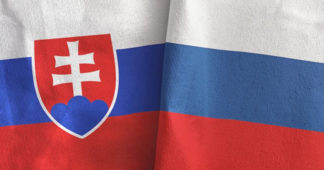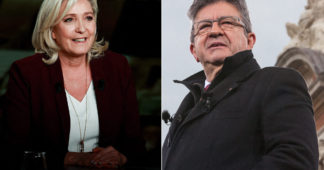By Nick Alipour
Sep 12, 2024
Germany’s Alliance Sahra Wagenknecht (BSW) and Slovakian Prime Minister Robert Fico’s Smer have confirmed a new attempt to strengthen ‘left-conservative’ ties in the European Parliament, but said a new group is still some way off.
The BSW, a new breakaway party from the far-left party Die Linke, has quickly become a major force in German politics. It has so far failed, however, to spearhead a new group in the European Parliament after the election as it had originally planned.
But a lawmaker from the Czech left-wing alliance Stačilo!, who have 2 MEPs, suggested this week that BSW could form a new group with Stačilo! and Smer within one year, as first reported by Euractiv.cz. A first coordination meeting between the two groups was scheduled for Wednesday.
BSW’s leader in the Parliament, Fabio De Masi, suggested on Thursday that his party would be open to linking up.
“We are currently exchanging views on technical cooperation with political forces that are in favour of diplomatic initiatives, public investment and social justice and do not belong to a political group,” De Masi told Euractiv.
A Smer spokesperson also told Euractiv Slovakia that “MEPs from SMER-SSD are interested in close cooperation with the left-conservative parties, including BSW and Stačilo!” but that “there is no need to comment on the situation further.”
But De Masi lowered expectations regarding an imminent group launch.
“The conditions for the formation of a parliamentary group do not currently exist and this debate therefore comes too soon,” he said.
EU rules require a political group to comprise at least 25 MEPs from seven member states to form a group in the European Parliament. Between each other, the three parties currently only share 13 lawmakers from three countries.
Joint support for “diplomacy”
Smer have previously expressed a desire to stay with the S&D, as Smer lawmaker Katharina Roth Nevedalova told Euractiv before the election.
Meanwhile, Italian party Movimento 5 Stelle (M5S), who negotiated with BSW before eventually joining The Left, told Euractiv that they will not seek closer cooperation.
There are synergies, however. All three parties see themselves as economically left-wing and socially conservative. Smer and BSW highlighted in particular their shared opposition to military aid for Kyiv and sanctions on Russia.
“It is encouraging, that there are partners in the EP with whom we can strive for peace and normalization of relations with Russia,” the Smer spokesperson told Euractiv Slovakia.
Most importantly, the parties are non-attached and thus remain disadvantaged in parliamentary business, such as the allocation of key positions and funding. This is to encourage the consolidation of MEPs into groups.
BSW is keen to “increase our rights and effectiveness as non-attached Members of Parliament,” De Masi pointed out.
[Edited by Owen Morgan]
We remind our readers that publication of articles on our site does not mean that we agree with what is written. Our policy is to publish anything which we consider of interest, so as to assist our readers in forming their opinions. Sometimes we even publish articles with which we totally disagree, since we believe it is important for our readers to be informed on as wide a spectrum of views as possible.










